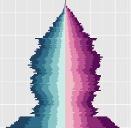Individual Based Model Population Simulation.
IBMPopSim 
The IBMPopSim package aims at simulating the random evolution of heterogeneous populations, called stochastic Individual Based Models (IBMs). Such models have a wide range of applications in various fields including actuarial sciences, biology, demography, or ecology. For instance, IBMs can be used for simulating the evolution of an heterogeneous insurance portfolio, of an spatial ecological population with interacting individuals, or for validation mortality forecasts.
The package allows users to simulate population evolution in which individuals are characterized by their age and some characteristics, and where the population is modified by different types of events including births/arrivals, death/exit events, or changes of characteristics. The frequency at which an event can occur to an individual can depend on his age and characteristics, but also on time and on the rest of the population (interactions).
IBMPopSim overcomes the limitations of time consuming IBMs simulations. This is done by implementing new efficient algorithms based on thinning methods, which are compiled using the Rcpp library. The package allows a wide range of IMBs to be simulated, while being user-friendly thanks to its structure based on simple build blocks. In addition, we provide tools for analyzing outputs, such a age-pyramids or life tables obtained from the simulated data, consistent with the data format of packages for mortality modeling such as StMoMo. See vignette(IBMPopSim) for more details.
Installation
The latest stable version can be installed from CRAN:
install.packages('IBMPopSim')
The latest development version can be installed from github:
# install.packages("devtools")
devtools::install_github('DaphneGiorgi/IBMPopSim')
First example to check installation
To illustrate the use of the package and to check the installation, a simple model with Poisson arrivals and exits is implemented.
library(IBMPopSim)
init_size <- 100000
pop <- population(data.frame(birth = rep(0, init_size), death = NA))
birth = mk_event_poisson(type = 'birth', intensity = 'lambda')
death = mk_event_poisson(type = 'death', intensity = 'mu')
params = list('lambda' = 100, 'mu' = 100)
# mk_model compiles C++ code using sourceCpp from Rcpp
birth_death <- mk_model(events = list(birth, death),
parameters = params)
If there are no errors then the C++ built environment is compatible with the package. The model is created and a C++ code has been compiled. The simulation is done using the popsim function.
sim_out <- popsim(model = birth_death,
initial_population = pop,
events_bounds = c('birth' = params$lambda, 'death' = params$mu),
parameters = params,
time = 10)
num_births <- length(sim_out$population$birth) - init_size
num_deaths <- sum(!is.na(sim_out$population$death))
print(c("births" = num_births, "deaths" = num_deaths))
## births deaths
## 952 981
Quick model creation
- We take here an initial population, stored in a data frame, composed of 100 000 individuals marked by their gender (encoded by a Boolean characteristic):
pop <- population(EW_pop_14$sample)
- The second step is to define the model parameters’ list:
params <- list("alpha" = 0.008, "beta" = 0.02, "p_male" = 0.51,
"birth_rate" = stepfun(c(15,40), c(0,0.05,0)))
- The last step is to defined the events that can occur in the population, here birth and death events:
death_event <- mk_event_individual(type = "death",
intensity_code = "result = alpha * exp(beta * age(I, t));")
birth_event <- mk_event_individual(type = "birth",
intensity_code = "result = birth_rate(age(I,t));",
kernel_code = "newI.male = CUnif(0, 1) < p_male;")
Note that these events contain some C++ statements that depend (implicitly) on the previously declared parameters in variable params.
- Finally, the model is created by calling the function
mk_model. A C++ source code is obtained from the events and parameters, then compiled using thesourceCppfunction of theRcpppackage.
model <- mk_model(characteristics = get_characteristics(pop),
events = list(death_event, birth_event),
parameters = params)
- In order to simulate a random trajectory of the population until a given time
Tbounds on the events intensities have to be specified:
a_max <- 115
events_bounds = c("death" = params$alpha * exp(params$beta * a_max),
"birth" = max(params$birth_rate))
Then, the function popsim can be called:
sim_out <- popsim(model, pop, events_bounds, params,
age_max = a_max, time = 30)
- The data frame
sim_out$populationcontains the information (date of birth, date of death, gender) on individuals who lived in the population over the period [0, 30]. Functions of the package allows to provide aggregated information on the population.
pop_out <- sim_out$population
head(pop_out)
## birth death male
## 1 -84.96043 NA FALSE
## 2 -84.86327 NA FALSE
## 3 -84.84161 NA FALSE
## 4 -84.79779 NA FALSE
## 5 -84.76461 NA FALSE
## 6 -84.76363 NA FALSE
female_pop <- pop_out[pop_out$male==FALSE, ]
age_pyramid(female_pop, ages = 85:90, time = 30)
## age male value
## 1 85 - 86 FALSE 224
## 2 86 - 87 FALSE 250
## 3 87 - 88 FALSE 213
## 4 88 - 89 FALSE 170
## 5 89 - 90 FALSE 180
Dxt <- death_table(female_pop, ages = 85:90, period = 20:30)
Ext <- exposure_table(female_pop, ages = 85:90, period = 20:30)
- Note that parameters of the model can be changed without recompiling the model.
params$beta <- 0.01
# Update death event bound:
events_bounds["death"] <- params$alpha * exp(params$beta * a_max)
sim_out <- popsim(model, pop, events_bounds, params,
age_max = a_max, time = 30)